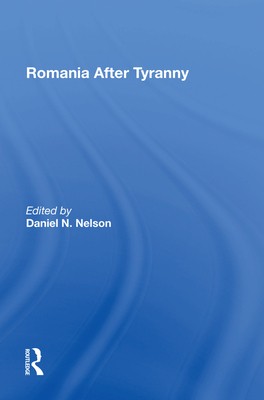
- We will send in 10–14 business days.
- Author: Daniel N Nelson
- Publisher: Routledge
- ISBN-10: 036728619X
- ISBN-13: 9780367286194
- Format: 15.2 x 23.1 x 2.3 cm, kieti viršeliai
- Language: English
- SAVE -10% with code: EXTRA
Reviews
Description
In 1973, Romanians were beginning to recognize that the regime of Nicolae Ceausescu, contrary to what his first five or six years in power seemed to imply, would bring no respite from communism. Instead, after a 1971 mini cultural revolution ended hope for a Bucharest spring and intellectual latitude was curtailed further in 1972-73, the ominous possibilities of Ceausescu were becoming evident. In 1973, I went to Romania on a dissertation research grant from the International Research and Exchanges Board. It was a year in which wide-ranging survey research was still possible. But it was also a time when historians and writers who had different ideas, or workers who gave thought to non-party union organization, felt the heavy hand of Ceausescu's Securitate. As happens to most graduate students and their field research, it was a formative experience with indelible impressions that remain today.
EXTRA 10 % discount with code: EXTRA
The promotion ends in 21d.03:31:43
The discount code is valid when purchasing from 10 €. Discounts do not stack.
- Author: Daniel N Nelson
- Publisher: Routledge
- ISBN-10: 036728619X
- ISBN-13: 9780367286194
- Format: 15.2 x 23.1 x 2.3 cm, kieti viršeliai
- Language: English English
In 1973, Romanians were beginning to recognize that the regime of Nicolae Ceausescu, contrary to what his first five or six years in power seemed to imply, would bring no respite from communism. Instead, after a 1971 mini cultural revolution ended hope for a Bucharest spring and intellectual latitude was curtailed further in 1972-73, the ominous possibilities of Ceausescu were becoming evident. In 1973, I went to Romania on a dissertation research grant from the International Research and Exchanges Board. It was a year in which wide-ranging survey research was still possible. But it was also a time when historians and writers who had different ideas, or workers who gave thought to non-party union organization, felt the heavy hand of Ceausescu's Securitate. As happens to most graduate students and their field research, it was a formative experience with indelible impressions that remain today.


Reviews